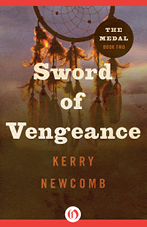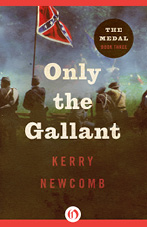Sword of Vengeance (32 page)
Read Sword of Vengeance Online
Authors: Kerry Newcomb

General William Tecumseh Sherman had hopes for a break in the weather. A little rain to settle the dust devils in the street wouldn’t hurt. He chucked his woolen frock coat and draped it over a nearby chair as his adjutant showed a dark-haired lieutenant into the schoolhouse. Swatting a fly from the corner of the headmaster’s desk, the general scattered a stack of requisition orders that needed his authorization. The quick-tempered, feisty commanding officer scowled and muttered an oath. Second Lieutenant Jesse Redbow McQueen knelt to gather the pages and returned them to Sherman’s desk, placing them near a worn leather-bound Bible and the general’s navy Colt. Sherman gruffly nodded his thanks and settled back in his chair, folding his hands before him on the desk. Then he stood and sauntered across the schoolhouse that served as his headquarters. He helped himself to a cigar from a box stored on top of a wooden cabinet. He was a tall, red-haired man with a scraggly beard and hazel eyes that glittered passionately at the world. Sherman was a man made for war. It suited him.
Voices and the sound of approaching horses drifted in through the open window as a troop of cavalry rode down Main Street. Wagons creaking on their axles, shouted orders, faintly muffled gossip, and every so often, scattered derision from the city’s unhappy inhabitants. Jesse shifted his stance and continued to suffer in silence, wearing the dusty blue uniform of a second lieutenant in the Union Army. General Sherman sized him up.
“So you’re the one from New Orleans.”
“Yes, sir.”
“You supplied Farragut with some rather crucial information about the city’s defenses.”
“I managed to learn a few things while I pretended to set up my law practice. Luck had a lot to do with whatever I managed to accomplish.”
“And nerve,” Sherman conceded. He scratched at his beard. His bleak eyes, as befitting some Lazarus newly summoned from the tomb, peered intently at Jesse. “I like nerve in my officers. The Union will not be saved without it.” Sherman stooped over and peered out the schoolhouse window as a detachment of troopers rode past. The general studied the returning patrol then returned his attention to the newly arrived officer. “What do I do with you, eh, until Major Abbot arrives?”
“Sir?”
“General Grant has envisioned you playing an intricate part in the campaign he’s planning. But I am as much in the dark as you. I’m sure Major Abbot will make all things clear on his arrival.” Sherman sat on the edge of his desk, propped one leg on his desk, and paused to light a cigar.
“Virginia tobacco, the very finest,” Sherman mused, puffing on the cigar. “A gift from Earl Van Dorn, my Confederate counterpart, holed up with General Pemberton in Vicksburg. I look aside if the occasional luxury—a case of wine, a smoked ham, or some coffee—is smuggled out of Memphis, southward to my old friend. Van Dorn in turn ships me cigars. Yet a month or a year from now we may be trading barrages. War is madness played out on a grand scale.”
Madness
, thought Jesse recalling the fall of New Orleans. His mind reached further back to the McQueen farm along the Canadian River. Even the Choctaws and Cherokees, full-bloods or mixed like himself, were split into warring factions. As the government agent for the territory, Ben McQueen, Jesse’s father, had seen the tranquil countryside become a battleground for night riders and vigilante groups owing allegiance either to the Union or the secessionist cause. Yes, war was indeed a madness that pitted father against son and brother against brother.
“You hail from the Indian Territory,” Sherman matter-of-factly stated. “I recall seeing that in the dispatch I received from Grant.”
“My grandmother was half-Irish, half-Choctaw, and practically raised me after the death of my mother.” Jesse began to perspire in his woolen uniform. The schoolhouse was stifling in the still heat. And without a cross breeze to stir the air, it was only going to get worse.
“You might be pleased to know that some of your neighbors have arrived in the city. Two … no … three brothers brought in a herd of horses for my cavalry. Fine animals, I am told. As for the brothers, I believe they went by the name of Stark.” The general noticed a change come over the second lieutenant; emotion seemed to drain from the young man’s features, and his gaze became guarded. What was he concealing? the general wondered. “You know them?” he asked.
Jesse nodded. His left shoulder began to ache where the scar tissue ridged his flesh. The Starks were mixed-blood Cherokees who farmed and ranched in the good years and were suspected of thievery and worse in the lean times. Jesse would never forget one night in particular, a dark night, and a mare in foal and a knife thrown by a hidden assailant. The blade had narrowly missed Jesse’s spine. Later on, Ben McQueen had found his thirteen-year-old son left for dead in the middle aisle of the stable. The mare had been killed and the foal stolen. There had been no proof the Starks were involved, but one of Elder Stark’s own mares just happened to produce a foal that same night. At least that was their claim.
“Yes,” said Jesse rubbing his shoulder. “I know the Starks.” When he did not elaborate, General Sherman shrugged, exhaled a cloud of tobacco smoke, and returned to his place behind his desk. Behind him, covering part of the back wall of the schoolroom, hung a map tracing the serpentine course of the Mississippi River. Tennessee was depicted on the map, as well as Mississippi and a portion of Louisiana. There were blank spaces and a few penciled-in corrections. Memphis had been hand-circled in black, as had New Orleans. Vicksburg lay between them, a seemingly impregnable stronghold almost entirely surrounded by dense forests, swampland, steep hills, and deep ravines—in short, an inhospitable terrain protecting this last bastion.
Federal forces had been trying to figure out a way to approach and take the city for months, all to no avail. Now Grant had a new scheme, which involved clandestine as well as overt measures. Jesse didn’t bother trying to guess his role in all this. No matter what scenario he devised, the truth always turned out to be twice as dangerous.
“Well now … tell me, are you really a second lieutenant?” Sherman asked.
Jesse actually held the rank of captain but he made no reply. Rather, he glanced at the door beyond which the general’s adjutant, Sergeant Wallace, had been posted in a narrow foyer that served as the school’s coatroom in winter. Wallace had been provided a desk and chair and there he remained throughout the middle hours of each day, screening the general’s visitors. On this Monday alone the burly sergeant had refused admittance to a local planter, the town’s indignant schoolmaster, and an irate tavern owner, furious at the improprieties of some overboisterous troopers.
None of that mattered to Jesse. He had arrived in Memphis under the guise of a newly commissioned second lieutenant, a young officer painfully innocent of the realities of war. The veteran soldiers stationed around the schoolhouse had immediately dismissed him as an untried recruit. General Sherman alone knew the truth behind Jesse’s deception.
“Don’t worry, we can speak freely here. Sergeant Wallace has been with me since Manassas,” the general remarked. “I trust him completely. His loyalty is above question.”
“Begging your pardon, General Sherman, but you aren’t the one who risks a firing squad if you are captured in the line of duty. I cannot afford to be careless.”
Sherman reddened. He had never been addressed in such a fashion by a junior officer, and he didn’t like it one bit. However, the general was too good a soldier not to see that Jesse made sense. Sherman had an army to protect him. A man like McQueen had only his wits and a heightened sense of caution to keep himself alive.
“Yes … I see.” Sherman clamped down on his cigar. The tip burned brightly as the general enjoyed his smoke. Clouds of smoke billowed toward an open window. “So be it,” the commander added. “You’ll find that junior officers are taking rooms at the Delta Hotel on Market Street. I will contact you when I have talked to Major Abbot.”
“Thank you, sir,” Jesse said, and saluted. Sherman acknowledged the gesture and returned the salute.
“By the way, Sergeant Wallace has a letter for you. It was forwarded to this command,” Sherman said. He attacked the stack of requisitions on his desk, his weapons of choice a quill pen and brass inkwell.
Jesse’s mood brightened at the general’s information. Something from home was exactly what he needed right now.
He took leave of the general and hurried from the schoolroom. He found Sergeant Wallace dozing in the noonday heat, dreaming, no doubt, of Milford, Connecticut, picnics on the green, and pretty girls serving cool lemonade to thirsty soldiers.
Jesse helped himself to the letter bearing his name and left the sergeant undisturbed.
Kerry Newcomb was born in Milford, Connecticut, but had the good fortune to be raised in Texas. He has served in the Jesuit Volunteer Corps and taught at the St. Labre Mission School on the Northern Cheyenne Reservation in Montana, and holds a master’s of fine arts degree in theater from Trinity University. Newcomb has written plays, film scripts, commercials, and liturgical dramas, and is the author of over thirty novels. He lives with his family in Fort Worth, Texas.
All rights reserved, including without limitation the right to reproduce this ebook or any portion thereof in any form or by any means, whether electronic or mechanical, now known or hereinafter invented, without the express written permission of the publisher.
This is a work of fiction. Names, characters, places, events, and incidents either are the product of the author’s imagination or are used fictitiously. Any resemblance to actual persons, living or dead, businesses, companies, events, or locales is entirely coincidental.
Copyright © 1991 by Kerry Newcomb
Cover design by Connie Gabbert
978-1-4804-7880-0
This edition published in 2014 by Open Road Integrated Media, Inc.
345 Hudson Street
New York, NY 10014









